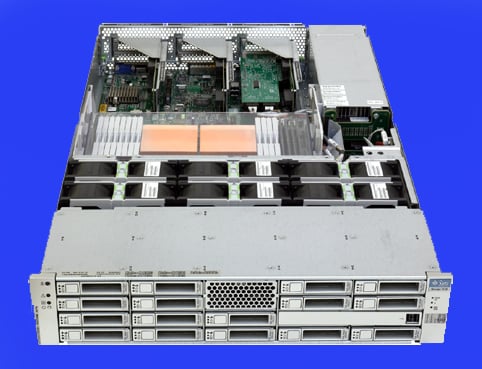This article is more than 1 year old
Sun trumpets radically simple open storage boxes
Ease on down that Amber Road
The high priests of open storage have finally delivered products for our approbation, three of them. Sun's radically new 7000 line of storage appliances combines embedded servers, drive arrays and a comprehensive open storage software stack in a low-priced bundle. Will customers take the bait?
Feeds
Feast on this; the three products from Sun's Amber Road project - think riches from the East - have fishy aspects. It starts with embedded Fishworks software and continues with codenames. The entry-level 7110 is called Iwashi, Japanese for a baby sardine. Then there is the mid-range 7210 Fugu product, Fugu being a Japanese pufferfish which is lethally poisonous if prepared incorrectly. Let's not read anything into that.
Finally Toro, Japanese for fatty blue fin tuna belly, is the high-end product, the 7410.

Speeds
The three models have, respectively, one, two and four quad-core Opteron processors. They span a huge storage capacity and performance range. The entry-level 7110 - pictured right - can have up to 2TB of 10,000rpm SAS drives (16 X 146GB), 8GB RAM, a single quad core Opteron CPU and Fishworks data services software including clustering, replication and analytics, layered on top of Open Solaris, ZFS and Dtrace analysing/optimising software.
That means it offers CIFS, NFS and iSCSI interfaces. It also has standard network and tape connectivity. This and the software environment is consistent across the range.
The 7210, based on the Thumper (X4500) chassis has 32-64GB of RAM, up to 46 1TB SATA drives, and up to 32GB (2 X 16GB) of write-biased STEC solid state drive (SSD) storage, called LogZilla. This tripartite storage layout is called a Hybrid Storage Pool Architecture and is shared with the 7410 which takes it further.
That machine, which can be clustered, has 16, 64 or 128GB of RAM, up to 288 1TB SATA drives, up to 16 16GB LogZilla SSDs and up to 6 read-biased STEC SSDs (ReadZilla). It comes as a 2U server with a SAS interface connecting external J4000 storage arrays, basically JBODs.
Sun says its Amber Road products represent a radically simpler and more powerful way to manage enterprise storage at a fraction of the cost of competing systems and delivering the best $/IOP, $/GB and watts/IOP in the enterprise storage market.
The Sun Storage (no StorageTek branding) 7110 costs $10,995 for 2TB, the 7210 pricing starts at $34,995 for 11.5TB, a single-node 7410 costs $57,490 for 12TB, while a 2-node 12TB cluster version costs $89,490.
For comparison, Sun's entry-level mid-range and modular 6140 array (dual RAID controllers, 356GB to 112TB and Fibre Channel or SATA drives) starts at $19,795. The larger 6540 (dual RAID controllers, to 224 FC and SATA drives, 365GB to 224TB) starts at $217,995.
The moment is now
For Sun this is a moment of truth. Its open software strategy has resulted in millions of developer downloads but the follow-on service and hardware sales haven't materialised as Sun had hoped. The time delay between millions of downloads and follow-on hardware sales grows longer by the day.
Open storage is another arm of Sun's strategy. Storage comes out to about 17 per cent of Sun's business today and the fastest growing part is open storage, with over 100 per cent growth year-over-year. Sun has thought long and hard and spent millions of dollars developing these systems. Will customers join its open storage crusade or has Sun given itself a dose of Fugu poison? ®
